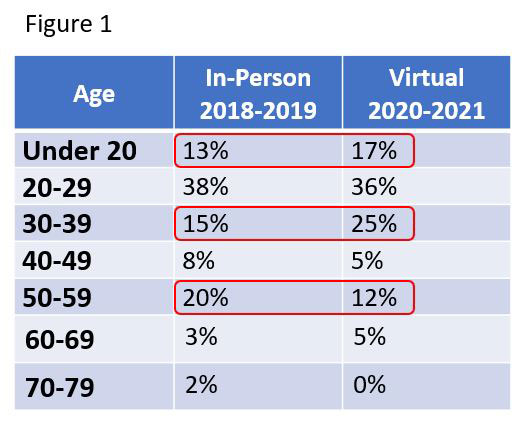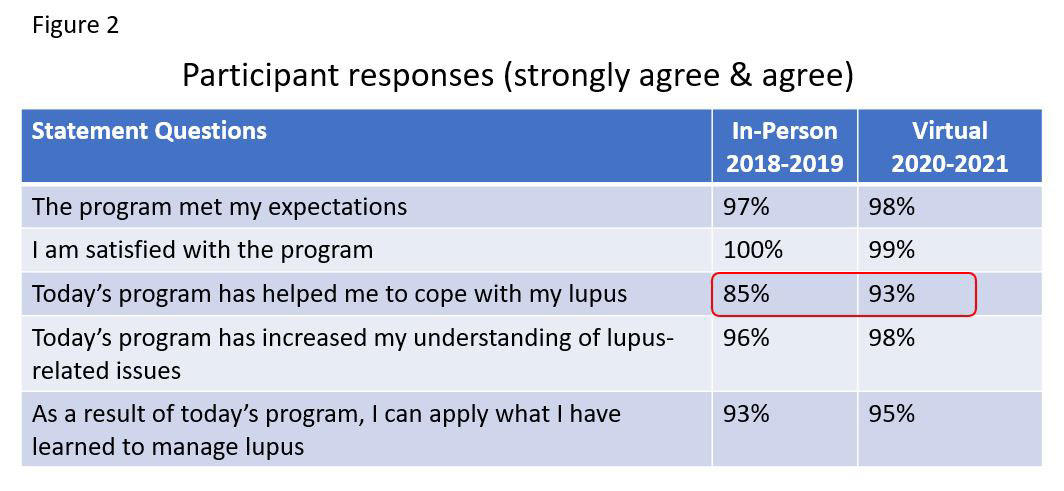Session Information
Session Type: Poster Session A
Session Time: 1:00PM-3:00PM
Background/Purpose: Studies have demonstrated the benefits of online peer support forums in meeting the mental health, disease self-management & coping needs of people living with a chronic illness. An analysis of session evaluations was conducted for a monthly psychoeducation group, ongoing since 2001, for teens & young adults with SLE & their loved ones, focusing on the effectiveness of an in-person support group that transitioned to a virtual platform.
Methods: A 28-item online survey with Likert scale, multiple choice & open-ended questions was given after each of the 9 virtual groups from Sept. 2020 to June 2021. The bilingual groups provide support & education strategies to manage & cope with SLE. The groups focused on SLE-related topics, such as Medications, Nutrition, Pain Management & Research. A comparison analysis was completed assessing: reach, satisfaction, knowledge, coping & disease management for in-person groups held in 2018-2019.
Results: In 2020-2021 there were 203 surveys (54%) submitted vs. 159 (90%) surveys in 2018-2019. Most (79%) respondents identified as female, 20% male, 53% Hispanic, 49% African American, 19% White, 7% Asian & 25% other race. Similar demographics were noted when comparing participants for 2018-2019. There was an decrease in Hispanic participants by 11% & an increase in African American participants from 37% to 49% in 2020-2021. Regarding age distribution of respondents for 2020-2021, there were increases in reaching our target population (see figure 1).
Almost all (99%) respondents reported satisfaction with the virtual groups; 98% agreed that the groups increased their understanding of SLE-related issues; 93% agreed the groups helped them cope with SLE; 95% agreed they could apply what they learned to manage SLE; 98% agreed the program met their expectations & 97% agreed that they would recommend this group. No significant differences were noticed in the areas above when comparing in-person groups conducted in 2018-2019. There was an 8% increase when respondents were asked about the group’s ability to help them cope with SLE in the virtual group (see figure 2).
Reach increased significantly in the transition to a virtual group, with 373 participants vs. 177 in 2018-2019. Analysis of open-ended responses highlighted benefits of a virtual group including removing transportation barriers, ability to join the meeting from anywhere & ease of participation via sharing a link. When asked about the support group’s transition to a virtual space, one participant shared “I would not have been able to attend the meetings due to location”. Some limitations reported were inability to connect one on one, no internet access & challenges using Zoom.
Open-ended responses further reinforced similar impact of the virtual vs in-person model. Participants shared “I feel understood & not alone in my disease as there are more people like me suffering from an invisible illness.”
Conclusion: Our results demonstrate the value of transitioning our peer support group to a virtual platform & its continued effectiveness & satisfaction. As things transition back to in-person, we will continue to assess our participants’ interest in a hybrid model utilizing both in-person & virtual groups to provide lupus support & education.
To cite this abstract in AMA style:
Rodriguez G, Calvache P, Mendez L, Cabrera K, Horton R, Imundo L, Rose-Smith J. Evaluating the Effectiveness & Impact of an In-Person Peer Support Group That Transitioned to a Virtual Platform During the COVID-19 Pandemic [abstract]. Arthritis Rheumatol. 2022; 74 (suppl 9). https://acrabstracts.org/abstract/evaluating-the-effectiveness-impact-of-an-in-person-peer-support-group-that-transitioned-to-a-virtual-platform-during-the-covid-19-pandemic/. Accessed .« Back to ACR Convergence 2022
ACR Meeting Abstracts - https://acrabstracts.org/abstract/evaluating-the-effectiveness-impact-of-an-in-person-peer-support-group-that-transitioned-to-a-virtual-platform-during-the-covid-19-pandemic/


